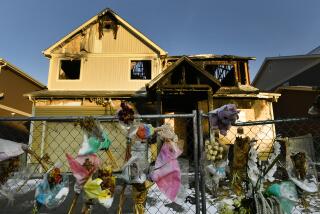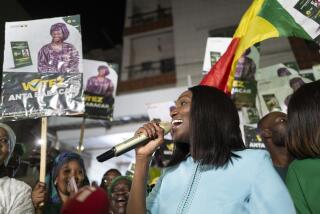Changing Lifestyles : A Glimpse of Senegal : This struggling African nation practices a more easy-going version of Islam than many societies. But there are efforts to promote more strictness.
TIVOUANE, Senegal â A good Muslim prays five times a day.
For the good Muslims of Senegal, that leaves time for all kinds of other activities. Like dancing. African drums ring out, and girls and young women leap forward one by one. They hike their brightly colored skirts and churn up the back-yard dust in a furious Senegalese dance.
Across town, French-speaking high school students in the English-language club meet to perform âWhere Have All the Flowers Gone?â and to recite poetry, quoting the likes of William Blake.
And on hard-bottom stools in a quiet salon, senior religious leaders of the community gather and contemplate serious matters of moral decay--and, not incidentally, economic development.
âTime,â the Senegalese will tell you, âis money.â
Or, if you should happen to be suffering nightmares, the Senegalese might also tell you where there is a good baobab tree under which to sacrifice a live chicken.
Fun-loving, pragmatic, devout and flavored in African style: Thus Islam can be glimpsed in the city of Tivouane, where breathtakingly modern high-rise mosques pierce the sky and streets still rattle with the clip-clop of faded old horse carts.
From ancient roots, Islam is powerfully ingrained in this former French colony on the westernmost edge of Africa. Nine of 10 Senegalese follow the teachings of Mohammed. But the Senegalese know that the success of their tolerant brand of Islam--in the path of fundamentalism advancing on the African continent--depends on the countryâs economic progress.
âMost programs failed in Africa because the leaders were corrupt. We believe we have trained enough people in the ways of Islam--and now is the time to use them as agents of development,â said Cheikh MâBacke Sene, a Muslim activist, high school teacher and former Fulbright scholar in the United States. âWhat we have is a new kind of spirit and attitude.
âWe recognize there is a moral crisis in Africa. Itâs a poverty-related crisis. What we have to do as Muslims is channel our energy into nation-building from an economic point of view.â
Although religious comparisons are usually flawed and can be offensive, Westerners nonetheless try to explain the mainstream Islamic brotherhoods of Senegal as something like the Protestant Reformation of Christianity. The core belief--adherence to the holy Koran--remains intact, but spiritual energy is progressive and doctrine restrained.
Other analysts say simply that Africa has changed Islam more than Islam has changed Africa.
At prayer time, typical Senegalese Muslims do not stop, wash and automatically bow toward Mecca. They continue with their labor, if they are lucky enough to have work in this struggling economy. There will be time for prayer later.
âWork is like pride,â said Assan Gueye, a 23-year-old Muslim. âIt does good for your heart. Have to make hay while the sun shines, isnât that what you say?â
In the capital of Dakar, 60 miles to the south, Penthouse magazine is openly displayed on a newsstand, a rarity in any African nation, let alone a Muslim one.
Bars flourish in urban Senegal, though not here in Tivouane, one of the nationâs two centers of Islamic spiritualism. Where alcohol is sold, Muslims with their sodas and coffee mix freely with those drinking a local beer.
Even in remote areas, it is possible for a group of visiting men to dine, privately, with unattached women without male supervision and without anyone raising their eyebrows.
At Christmas, Senegalese Muslims string holiday lights in their cities, exchange wrapped gifts and plan elaborate parties, which typically begin at 1 a.m. and last until dawn.
Animist traditions also do well in the shadow of the mosque. High school teacher Sene recalled that he recently was having troubling dreams. So he went to market and picked out a proper hen, which he sacrificed at a tree that his family regards as sacred.
âOf course it worked,â Sene said, smiling. âWe still have our background that we cannot throw away, despite our Islam.â
The Senegalese describe their Islamic sects as brotherhoods. The most numerous are the Mouride, who make up 40% to 45% of the Muslim population. Young men in urban areas are particularly drawn to the Mouride, and they make up the high-growth group in a country where the median age is 17.
Thirty percent of the Muslim population is from the Tidjane brotherhood. The remainder of Senegalâs Muslims belong to a dozen or more smaller sects, including some of distinctly conservative bent.
In this nation where one political party--the Socialists--has held power since independence, the brotherhoods and their marabout , or leaders, form the closest thing to a social and political counterweight. The balance has made Senegal among the most stable of African nations, and one with a distinctly friendly attitude toward the United States.
But Senegalâs easygoing Islam is under pressure.
In urban areas, the Senegalese are busy. Sparks fly at the blacksmithâs shop, the markets bustle, the sea is filled with fishermen long before dawn, and every street corner is crowded with shoeshine boys and vendors.
But this enterprising spirit has not lifted Senegalâs economy. Economic growth can barely keep up with rising population. Up to 20% of the work force is unemployed. Those with jobs earn less than $1,000 a year on average.
Hard-worked cropland is turning into desert. The national infrastructure is worn and weakened, and, last year, international aid of $338 million barely covered the interest payments on Senegalâs national debt.
Even among successful Senegalese, tension between modern and traditional economic life is apparent. The contemporary drive for success is restrained by deeply rooted expectations that any member of a family or neighborhood who has a job is obliged to assist those who do not.
In Tivouane, inviting three out-of-town guests to lunch means feeding 40 neighbors as well. Many Senegalese try to skirt this duty by investing their money in concrete blocks. No one is apt to ask for a loan of blocks, which accounts for the plethora of half-begun homes all over the countryside--Senegalese quietly banking their futures.
Others channel their ambitions into trying to obtain a travel visa to Europe or the United States.
Into this economic fallow has moved a brand of Islam distrusted in the West. A dozen years ago, fundamentalist reformers began the call for an Islamic state in Senegal. That cry is still being carried on the sandy Saharan wind known as the harmattan.
Ibrahima Toure, a college-educated Muslim in Dakar, says that almost none of his young friends in the city find conservative, fundamentalist Islam appealing. âBut in the countryside, three of 10 young men will at least listen,â he said.
In recent months, the Dakar government has closed down two groups--the Islam-African Relief Agency and Human Appeal International and expelled their leaders. Both groups were suspected of proselytizing believers to the fundamentalist Islam of Sudanâs Hassan Turabi National Islamic Front.
Last February, a simultaneous student demonstration and opposition political rally degenerated into violent riots in Dakar. Six police officers were killed. Government officials said they suspected agitation by conservative Muslims. More than 20 suspects were arrested and held for six months.
But only on the smallest scale are Americans in Senegal lending support to the economic goals of this countryâs mainstream Islamic leaders.
James Pollock, counselor for public affairs at the U.S. Embassy, was recently made an honorary citizen of Tivouane. for his encouragement of educational exchanges. Seringe Cheikh Dia, a Tivouane Islamic marabout , responded eagerly to Pollockâs visit. He said it showed a shared concern between a small nation and a large one. âWhatever is good should be supported; whatever is bad should be fought.â
âWhat youâve said you want for Senegal,â Pollock replied, âis what a large percentage of Americans also want for Senegal.â
More to Read
Sign up for Essential California
The most important California stories and recommendations in your inbox every morning.
You may occasionally receive promotional content from the Los Angeles Times.










